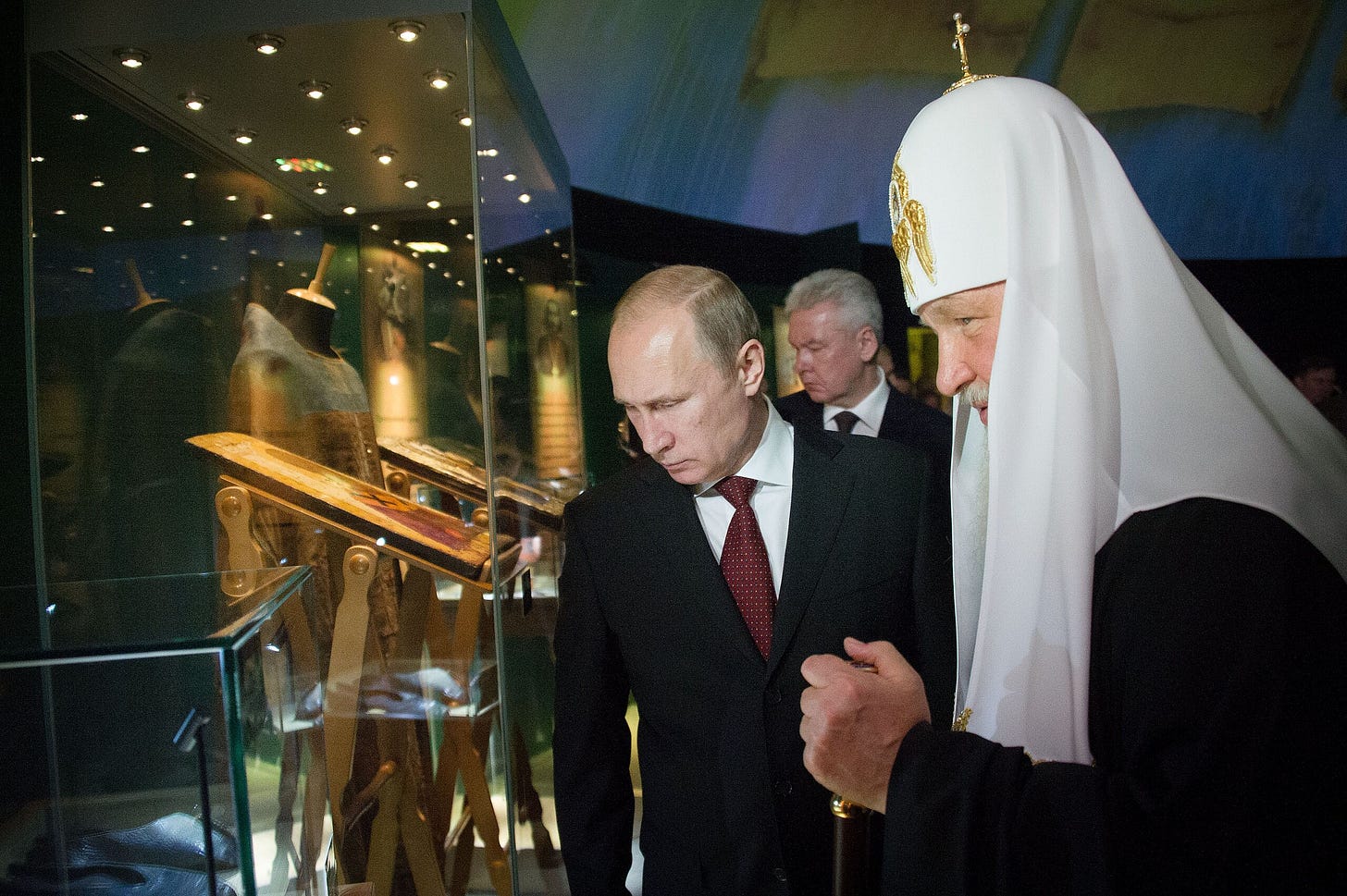The Kremlin’s spiritual phishing
Click on ‘traditional values’ and get kidnapping, torture, murder

In September, I joined a series of meetings in Washington, DC, organized by the Free Russia Foundation—briefings with US officials, policy analysts, academics, and human rights groups, as well as a public panel at the Atlantic Council moderated by Vladimir Kara-Murza, a prominent former Russian politician and political prisoner who survived two poisoning attempts. One of our main themes was religious freedom and how Moscow uses the Russian Orthodox faith to justify and bolster its repression inside Russia and occupied Ukrainian territories, and its aggression against Ukraine.
During my flight home, Senator Chuck Grassley, Republican of Iowa, cited our report on the Senate floor, declaring that the Moscow Patriarchate of the Russian Orthodox Church has become an instrument of repression.
The Empire struck back immediately. Kirill Dmitriev, the Russian presidential envoy for foreign investment, posted on X that he had had “positive discussions with the Russian Orthodox Church on recognizing Charlie Kirk’s spiritual contributions to Christianity,” referring to the conservative US political organizer and supporter of President Donald Trump who was shot to death in Utah in September. Dmitriev predicted an imminent Church article praising Kirk’s “advancement of Christian causes.” The same day, a piece appeared under the byline of a prominent bishop named Metropolitan Tikhon Shevkunov. “In the hearts of millions of his like-minded followers and friends, Charlie’s martyric death breathed new, greatly multiplied life in service of their goals, thoughts and convictions,” Tikhon writes familiarly about a man he admits was “virtually unknown” in Russia.
Tikhon is widely believed to be Putin’s confessor. But personally, as someone who was ordained an Orthodox priest more than 23 years ago, I do not think Putin has a confessor. It is said about Ramón María Narváez, a Spanish general and statesman (1800-1868), that when he was dying, a priest came and asked him if he forgave his enemies. “I do not have any enemies,” was the reply. “I had them all shot.” Putin is of that kind.
Tikhon belongs to a conservative wing of the Moscow Patriarchate. Praise for an evangelical Protestant American is not common in such circles, but quick obedience to the Kremlin certainly is. Tikhon has acknowledged that the Church’s Soviet-era participation in ecumenical outreach was pragmatic and often orchestrated by the state. Today, that pattern is being repeated in a different register: religious language as a mask for political ends.
“Traditional values” is a key part of that project. Introduced into Russian political discourse after mass protests of 2011–12 against Putin’s return to the Kremlin for a third presidential term, the concept functions in two ways: At home, it helps the regime claim moral custody; abroad, it is intended to appeal to aggrieved conservative Christians to make Putinism look attractive. But the attraction is largely theatrical. In Russia, high divorce and abortion rates belie the rhetoric; as the Bulgarian scholar Bojidar Kolov has observed, “traditional values” in this context are an empty, phantasmic signifier propping up a hegemonic political narrative.
The hypocrisy can be grotesque. Last spring, Maria Lvova-Belova—the presidential children’s rights commissioner who is subject to an International Criminal Court arrest warrant for the alleged deportation of Ukrainian children—divorced her husband, an Orthodox priest with whom she had nine children, and married Konstantin Malofeev, a prominent Orthodox media magnate who is under US and European sanctions for his role fomenting separatism in eastern Ukraine and supporting Russia’s aggression against Kyiv. Shortly afterward, she congratulated Russians on the Day of Family, Love and Fidelity.
As far as Putin is concerned, nothing is known about his personal life except for a 2013 public announcement of his divorce from the mother of his first two children. We all saw the sharp contrast between the images of the stalwart opposition figure Alexei Navalny, who died in prison in 2024, with his lovely family and the notorious photos of Putin, celebrating his birthday in 2021 with his defense minister in the Russian taiga. Did Cain not kill Abel out of envy?
Religious freedom—a foundational American value—is targeted wherever Russia wields power. In the occupied Ukrainian territories, members of evangelical and other non-Orthodox communities have been threatened, denounced as “American spies,” even told they should be “buried alive.” Kidnapping, torture and the murder of those who resist the Kremlin’s “Russian World” share space with sermons praising spirituality and “traditional values.” The Orthodox rhetoric does not constrain repression but justifies and camouflages it.
In many corners of today’s Russian Orthodoxy, such “values” have become a substitute for Christ. Patriarch Kirill himself has suggested that Russia’s moral affinities place it “closer to Islam” than to some Western Christian communities, and the idea of a “Russian World” now operates as the ultimate ethical criterion: Actions are judged by the extent they conform to that construct. Father Nikolai Platonov, an anti-war priest who fled with help from the NGO in which I’m involved, Mir Vsem (Peace Unto All), put it bluntly: “Run, run! A madman is in power who will hold on at any cost… Run, God is no longer here.”
To declare Charlie Kirk a martyr is to equate dissent with sacrilege—to say that opposition equals blasphemy. Malofeev and Alexander Dugin, a pro-Kremlin fascist ideologue who is influential in right-wing movements around the world, have already labeled the US Democratic Party a “terrorist organization.” Such declarations are not abstract: they map onto tactics used to dehumanize and intimidate.
Presenting Russia as a guardian of family and spiritual freedom is a form of spiritual phishing. It asks American conservatives to lower their guard and become unwitting vectors of Russian soft power. I’d advise you to treat this offer the way you treat suspicious e-mails: Use the spam filter, and don’t click on the links.
Andrei Kordochkin is a Russian Orthodox priest. He was forced out of the Moscow Patriarchate’s representation in Madrid and currently resides in Germany, working on a postdoctoral dissertation on the religious aspects of contemporary Russian ideology.

